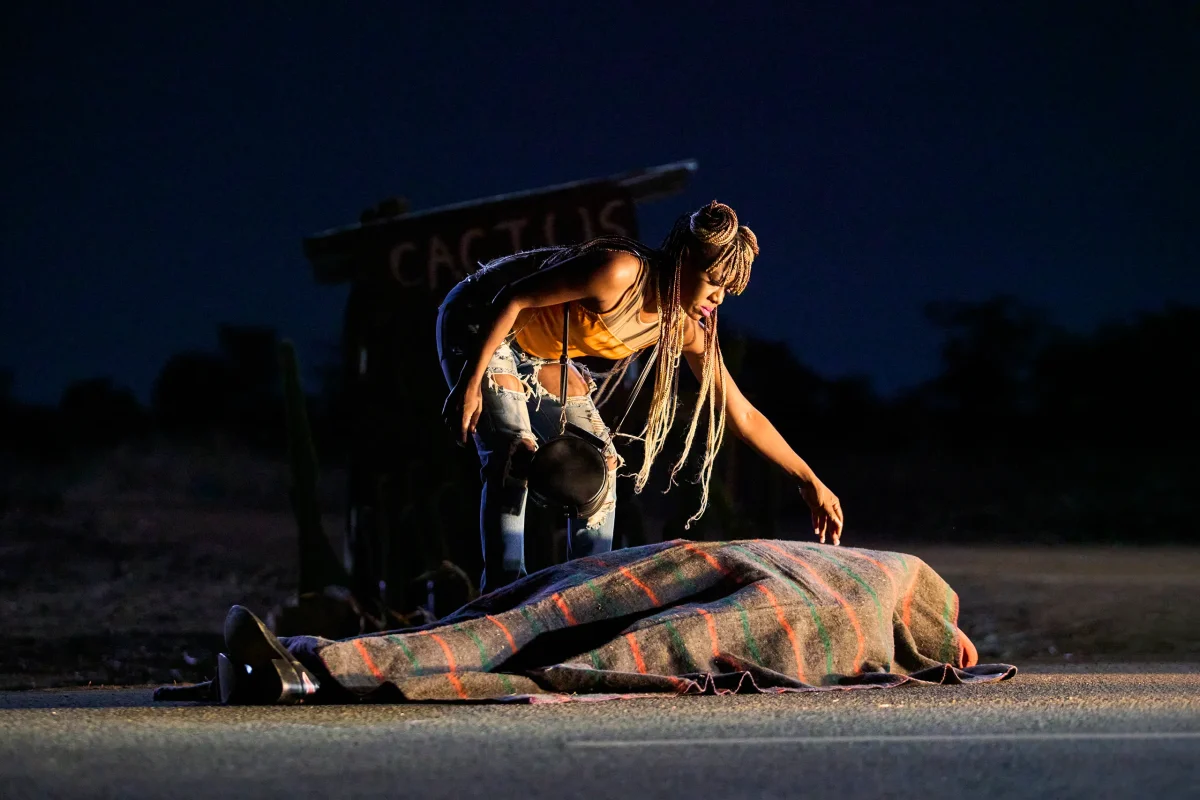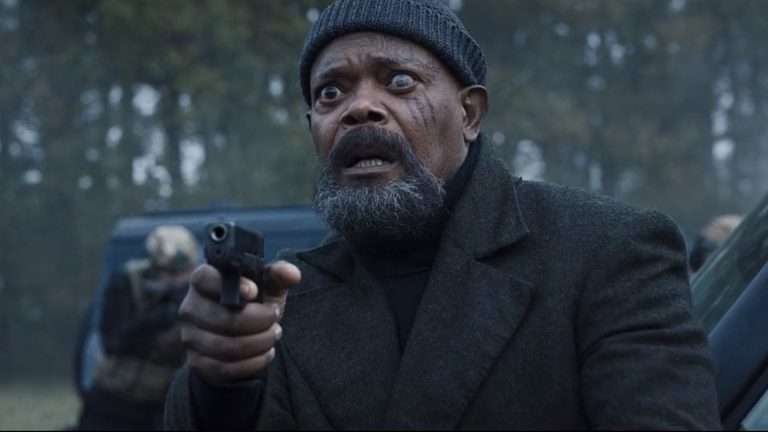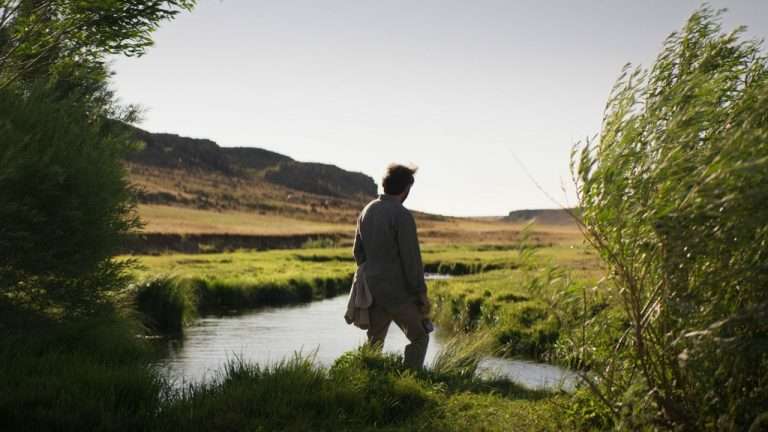“On Becoming A Guinea Fowl” represents the most interesting type of coming-of-age story. While it is narrowly focused on one young person’s self-actualization, the film evolves to make observations about the surrounding culture. It’s not often that an emerging filmmaker has such confidence in crafting an unusual tone, but writer-director Rungano Nyoni finds the absurdities within cultural reverence for the past. While the stilted, pointed humor of “On Becoming A Guinea Fowl” is a stylistic choice that certainly embellishes its idiosyncrasies, Nyoni cuts deeper as the film unpacks the deafening silence perpetrated by those with something to hide.
Set in Nyoni’s home country of Zambia, “On Becoming A Guinea Fowl” follows the young woman Shula (Susan Chardy) in the aftermath of a particularly excessive nighttime party, in which she was dressed to resemble Missy Elliot. Upon her drive home, Shula discovers a body in the middle of the road, which just so happens to be that of her Uncle Fred (Roy Chisha). Shula’s hesitation on how to proceed kicks off a mystery that “On Becoming A Guinea Fowl” solves fairly efficiently. Although Zambian traditions revolve around the honoring of the dead, Shula knows for a fact that Fred’s transgressions should not grant him this level of respect from the community.
There’s a sharpness to Nyoni’s writing that allows “On Becoming A Guinea Fowl” to not leave the viewer in anticipation, as the film leaves little room for ambiguity. It examines the direct reactions from each member of Shula’s extended family as they mourn Fred’s death. While the film delicately weaves in between different characters as they each process the news in different ways, there’s an undercurrent of anger based on how little any subsequent conversations will actually solve. Bemba culture believes that people are inherently good, and despite the evidence that Shula might bring to the contrary, Fred will likely be remembered in a positive light.
The conflict at the heart of “On Becoming A Guinea Fowl” is one between compassion and tradition, as Shula goes on to recognize that individual sympathies are irrelevant if there is not a significant change in the way that men of the community are remembered. There’s dark humor that surrounds the situation, as the pomp and spectacle of Fred’s funerary arrangements are in sharp contrast to the banal nature of his demise.
Even if Shula tends to be a reclusive character whose interiority takes focus to pick up on, there’s enough background on her relationship with Fred to give the audience her feeling of righteous anger. This is a frustration that continues as “On Becoming A Guinea Fowl” cuts deeper into the infrastructure of Zambian culture, as it often embodies a culture of silence that has impeded progress.
The bizarre nature of the funeral itself leads “On Becoming A Guinea Fowl” to make its most insightful observations. Beyond the requirement that each member of the family display their grief openly, there is a suggestion that those whose expressions don’t resemble a similar, seemingly scripted sentiment are invalidated.
“On Becoming A Guinea Fowl” is scathing in its analysis of the patriarchy, as the women of Shula’s community are sidelined to what seems like a contest of who can have the most overblown emotional breakdown. While the men are permitted to give more measured responses, they often speak as a consensus, offering little opportunity for divergence as they articulate what exactly Fred’s legacy should be.

“On Becoming A Guinea Fowl” features one of the year’s most impressive ensembles, but the perspective is mostly confined to Shula, who has come to view herself as an outsider within her family. Although this emotional barrier can sometimes be a hindrance when the film gets specific in addressing cultural norms, there are exceptions in the cast of particularly standout ensemble players, including Shula’s cousin, Nsansa (Elizabeth Chisela). Nsana’s drunken recounting of a night spent with Fred speaks to the abundance of his maliciousness, but also highlights how removed he was from any consequences. The fact that Nsana could make admissions in such a casual setting leads Shula to discover the many other members of her extended community who could recite similar anecdotes.
While the absurdity of tradition gives “On Becoming A Guinea Fowl” a dark sense of humor that at times becomes surreal, the film’s approach to Zambian culture is more complex than it may have initially seemed. Nyoni is not attempting to burn down societal hallmarks that have existed for generations, as there is a beauty in the idea that people are born with inherent goodness. The issue that the film picks up on is that cultural normalities are no longer used as inspiration to become better people, but as excuses that the powerful take advantage of to justify their transgressions.
Shula finds it a challenge to make even the slightest impact, as the preordained reactions of grief threaten anyone who would dare to speak up. The idea is placed amid young women that any reports about masculine abuse aren’t only likely to be deemed false, but seen as insulating to the good standing of the community.
Although “On Becoming A Guinea Fowl” is quite eye-opening in this regard, it’s also a film that is righteously devoid of answers. Shula’s attempts to spread awareness and raise questions may be a step in the right direction, but only a few of her elders are willing to even have a conversation.
The choppy, sporadic nature of “On Becoming A Guinea Fowl” can occasionally rob the film of its momentum, as some moments may have played better had they been able to luxuriate in the silence.
Likewise, the uncomfortably prolonged sequences set within the group environment are effective in identifying the chaotic crisis of ethics, but they’re often caught reiterating the same point. While the laboriousness may have been intentional on Nyoni’s part, they are often undercut by the use of flashbacks, which bring forth information that may have been better conveyed in more subtle ways.
These occasional hiccups aren’t enough to derail what is an extraordinary vision that indicates the emergence of an exciting new voice in international cinema. As personal as “On Becoming A Guinea Fowl” feels, the auteurial choices that Nyodi makes show a patience, reverence, and creativity of deep intentionality. It’s a film that should not only promote her career, but prompt larger discussion about the subjects that it so hauntingly unpacks.



![Triple Threat [2019] Review: An Enormous Waste of Talent & Potential](https://79468c92.delivery.rocketcdn.me/wp-content/uploads/2019/09/triple-threat-screenshot-1-768x320.jpg)



![Nocturnal Animals [2016]: Reality meets Fiction](https://79468c92.delivery.rocketcdn.me/wp-content/uploads/2017/02/nocturnalanimals1-768x511.jpg)
